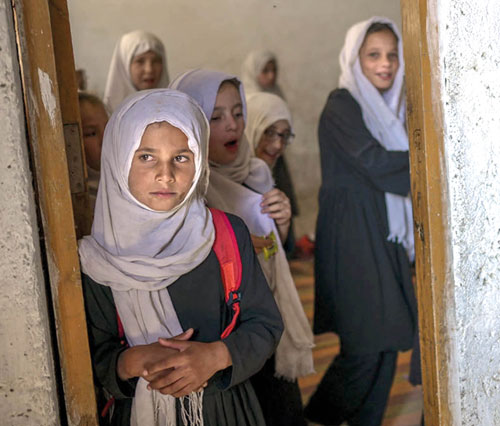A social media campaign has been launched under the name “Let Afghan Girls Learn.”
The organizer of the event said that its goal is to immediately open the gates of secondary and high schools for girls.
“This is a non-political campaign. The goal is to invite different guests for a week, both Afghans and foreigners, knowledgeable professors and any people who will discuss the opening of schools,” said Obaidullah Bahir, host of the campaign.
Some students said that due to the closing of schools for girls they have lost access to the Kankor exam and now their future is unknown. They said this year “thousands of girls were prevented from taking the Kankor Exam.”
These students asked the Islamic Emirate to open secondary schools for girls so they can gain entrance for the upcoming Kankor exam.
Nazanin is a 12th grade student and due to the closing of the schools for girls she could not participate in the Kankor exam, and she said that all her dreams to continue her education have turned into despair.
“We just want the school to be opened, we are worried about our future, we want the schools to be opened so that we can study,” said Nazanin, a student.
“The 11th grader who went to 12th is without a future, the 12th grader who is studying to prepare for Kankor is also unlucky,” said Lima, a student.
Some female students who are not allowed to go to school say they face depression.
“I request the Islamic Emirate to reopen the schools for girls as soon as possible because we want to be educated and to study and make our country progress,” said Arezo, a student.
However, the officials of the Ministry of Education did not provide a comment on the issue after repeated requests.
Meanwhile, some religious clerics said that depriving girls of school is against Islamic law.
“No one can say that from Islam, pertaining to girls, especially in Afghanistan–to the extent that we are in Afghanistan because we need our sisters to study–it is forbidden for them to go to school. I think that this is a strategic issue,” said Rahmatullah Norzai, professor of religious scholars.
At the same time, as girls’ schools are closed, the presence of women in higher education institutions and entrance exams have also decreased.
Meanwhile, residents of Day Mirdad, a district in the southern part of Maidan Wardak Province, said that no girls’ schools have yet been built there and that many of the province’s girls are deprived of an education.
They asked the Islamic Emirate to reopen girls’ schools across the country above the sixth grade in addition to building girls’ schools in Day Mirdad.
“Go and check that there are no females’ schools in the upper and lower parts of this district,” said Hewadullah, a resident of Day Mirdad district.
“Science helps people learn about Allah, and people are not opposed to learning science; instead, they desire education,” said Rahmatullah, another resident of Day Mirdad district.
There are no cultural restrictions against females attending school, according to the residents of the Day Mirdad district.
“We don’t have a problem with girls’ education, we want girls’ schools to be built in our area,” said Khan Mohammad, a resident of Day Mirdad.
“We want our sisters and daughters to attend school so that they can learn their rituals and be able to write,” said Sayed Mohammad, a resident of Day Mirdad.
“People are interested in sending their daughters and sisters to school to learn something,” said Saifullah, a resident of Day Mirdad.
Meanwhile, local Maidan Wardak officials reported that no girls’ school has been built in the Day Mirdad district as a result of the war. He said that work on the construction of a school in the area has already begun.
“Revolutions (battles) have prevented the construction of schools for girls in various places, including the Day Mirdad district,” said Gul Wali Muttaqi, head of education in Maidan Wardak.
Even though no girls’ school have yet been built in the Day Mirdad district, some girls attend informal classes there up to the sixth grade.










